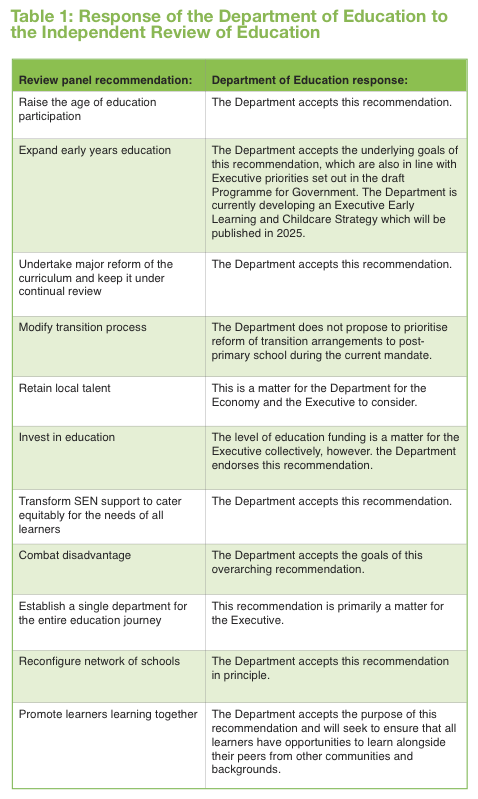Strategy for transformation of education imminent

In October 2024, Minister of Education Paul Givan MLA and the Department of Education responded to the findings and 25 recommendations of the Independent Review of Education in Northern Ireland and indicated that a strategy for the transformation of education would be published imminently.
Issued in December 2023, Investing in a Better Future, the final report of the Independent Review of Education was a key commitment of the New Decade, New Approach agreement, and the culmination of two years of work undertaken by a review panel comprising five education experts.
When its report was published, panel chair Keir Bloom commented: “We have sought to set out a series of deliverable recommendations that will change the landscape of education in Northern Ireland – building on its strengths but also tackling weaknesses.”
Establishing a set of proposals for reform of the education system over the coming two decades, Investing in a Better Future made 25 key recommendations (see Table 1).
Having considered these recommendations, the Minister of Education outlined his position on the direction of travel for education. Speaking in the Assembly on 21 October 2024, he observed: “The Independent Review is very clear in its key recommendations and action points, to reform our education system… The watchword of the review is reform, and today I am drawing on the report to set out my immediate priorities.”
These priorities for education reform during the current mandate, he says, include improvement of assessment, qualifications, and schools, alongside measures to reduce educational disadvantage. This reform is intended to be supported by increased investment in teacher professional learning.
The Minister also committed to the publication of “a clear and cohesive strategy for education” detailing his plans for transformation. At the same time, the Department is set to publish legislation to raise the age of compulsory education participation. These proposals, the Department says, will be published “in more detail over coming weeks”. At time of writing, this has not yet occurred.
In the meantime, the Department has detailed its acceptance of “most of the recommendations falling within its remit” while highlighting that there may be a varied approach to implementation. Given the “significant resource implications”, it advocates a phased approach.
Investment
Addressing the Review’s identification of a “funding shortfall” and the £155 million required to bridge the per-pupil funding gap between Northern Ireland and England and Wales, the Minister concedes: “Real-term cuts over recent years have had a lasting and detrimental impact on our young learners.”
As such, Givan expresses his ambition to “reverse the legacy of historic underfunding” to deliver a more prosperous future and recognises that education is “the foundation of all economic, social and political development” and an investment in future generations.
Curriculum
On the same day as he established his department’s response to Investing in a Better Future, the Minister announced a Review of the Northern Ireland Curriculum.
Commenting, the Minister said: “Curriculum is at the centre of every classroom, every school and indeed of our entire education system. The Independent Review is very clear – we have not invested sufficiently in curriculum review, advice, or resources. I am giving my assurance that this will change.

“I am pleased to announce that I have commissioned, Lucy Crehan, an international expert in education policy, to carry out a focused, timebound review that will examine curriculum design and delivery. I want every child to be taught a broad, ambitious and knowledge rich curriculum.”
University fees increase
Recommendation number nine, as per Investing in a Better Future, suggests that more should be done to retain local talent. More specifically, the review panel recommends that the number of places at local universities be increased to a point whereby the ratio of places to age cohort reaches equilibrium with Britain.
“To fund this growth, the fee level must be modified. The process should commence as soon as feasible with a progressive 10 per cent rise. Fee parity with England should be accomplished within a decade,” it said.
In its assessment, the Department of Education indicates that this is a matter for the Department for the Economy and the wider Executive to consider.
In response to a query from agendaNi, a Department for the Economy spokesperson said: “The Minister is on record that he is not in favour of above-inflation increases in the tuition fee level.
“The Minister is committed to working with the higher education sector to embed sustainable funding arrangements that enable the sector to thrive and to create more opportunities for young people.
“The Minister has already announced more than 500 additional student places at local universities with the Magee Taskforce in place to oversee the Executive’s commitment to deliver 10,000 student places in Derry.
“In addition, the Minister has committed to a review of higher education funding which will consider both the financial sustainability of higher education institutions here.”





